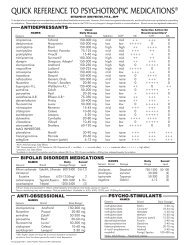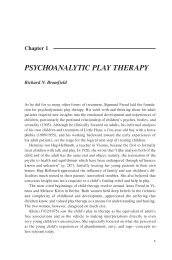IRAQ WAR CLINICIAN GUIDE
Iraq War Clinician's Guide - Network Of Care
Iraq War Clinician's Guide - Network Of Care
You also want an ePaper? Increase the reach of your titles
YUMPU automatically turns print PDFs into web optimized ePapers that Google loves.
Iraq War Clinician Guide<br />
P P<br />
19 Military Personnel<br />
-<br />
Conclusions<br />
Clinicians involved in the treatment of casualties returning from Operation Iraqi Freedom require<br />
an understanding of the military system in which these service members work and receive their<br />
medical care. Unlike prior conflicts, casualties from this war will likely receive treatment services<br />
in a variety of settings by providers from non-military professional backgrounds.<br />
Diversity within the military populations suggests that evacuated military patients are likely to<br />
come from different areas of the country and vary in terms of ethnic and cultural heritage. There is<br />
an increasing number of women as well. Patients' military experience may vary considerably<br />
depending upon the military component (e.g. active, reserve or National Guard) to which these<br />
service members are assigned. They may have been exposed to a variety of different combat<br />
stressors, depending upon their site of duty, the nature of conflict to which they have been<br />
exposed, and the roles in which they have served. The literature is clear that certain psychiatric<br />
conditions, including acute stress disorders and PTSD, are not uncommon responses to individuals<br />
exposed to combat. Clinicians must be aware of other psychiatric and organic disorders that might<br />
also contribute to their presentation, however.<br />
The military system is designed to minimize psychiatric disorders on the battlefield through predeployment<br />
screening and by providing mental health services in the combat setting. When<br />
evacuation is required, service members may be treated within several echelons of care that are<br />
established. Additionally, military regulation guides the appropriate evaluation of psychiatrically ill<br />
military patients. Service members with behavioral or emotional disorders may require discharge<br />
from service through the Medical Evaluation Board (MEB) process or through command<br />
determined administrative separation.<br />
All of these factors can contribute to the clinical condition of an evacuated soldier, airman, 01<br />
sailor. An appreciation of these complex issues will serve the clinician well in evaluating and<br />
treating service members psychiatrically evacuated from theater.<br />
References<br />
Benedek, D.M., Ursano, R.J., Holloway, H.C., No~lood, A.E., Grieger, T.A., Engel, C.C., et al. (2001).<br />
Military and disaster psychiatry. In N.J. Smelser & P.B. Baltes (Eds.), International encyclopedia of the<br />
social and behavioralsciences, Vol. 14 (pp. 9850-9857). Oxford, England: Elsevier Science.<br />
DiGiovanni, C., Jr. (1999). Domestic terrorism with chemical or biological agents: Psychiatric aspects.<br />
American Journal of Psychiatry, 156, 1500-1505.<br />
Franz, D.R., Jahrling, P.B., Friedlander, A.M., McClain, D.J., Hoover, D.L., Bryne, W.R., et al. (1997).<br />
Clinical recognition and management of patients exposed to biological warfare agents. Journal of the<br />
American Medical Association, 278, 399-411.<br />
Jones, F.D. (1995a). Disorders of frustration and loneliness. In F.D. Jones, L.R. Sparacino, V.L. Wilcox, J.M.<br />
Rothberg, & J.W. Stokes (Eds.), Warpsychiatry (pp. 63-83). Washington, DC: Borden Institute.<br />
Jones, F.D. (1995b). Psychiatric principles of future wadare. In F.D. Jones, L.R. Sparacino, V.L. Wilcox, J.M.<br />
Rothberg, & J.W. Stokes (Eds.), Warpsychiatry (pp. 113.132). Washington, DC: Borden Institute.<br />
Schlenger, W.E., Caddell, J.M., Ebert, L., Jordan, B.K., Rourke, K.M., Wilson, D., et al. (2002). Psychological<br />
reactions to terrorist attacks. Findings from the National Study of Americans' Reactions to September 11.<br />
Journal of the American Medical Association, 288, 581-588.<br />
--<br />
DEPARTMENT OF VETERANS AFFAIRS<br />
NATIONAL CENTER FOR PTSD




